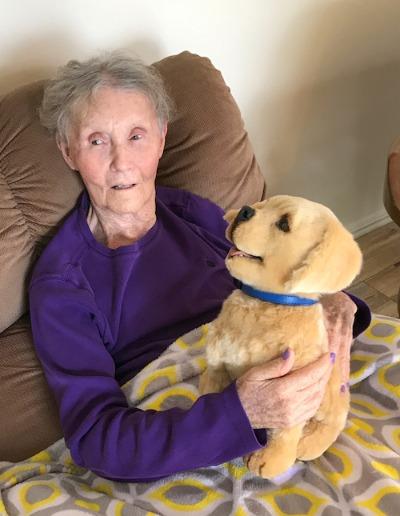BEHAVIORAL INTERVENTION STRATEGY REDUCES USE OF MEDICATIONS IN DEMENTIA
 Out of tragedy and heartbreak came inspiration: Nancy Stevens, mother of Tombot CEO and Co-Founder Tom Stevens, was diagnosed with Alzheimer’s in 2011. Soon after, he had to take her beloved dog away due to her cognitive impairment. To make up for his mother’s heartbreak, Tom began what would become a multi-year research exploration into the science of emotional attachment, especially as it relates to relationship formation with pets. Tom also learned a great deal about dementia, behavioral and psychological symptoms of dementia, psychotropic and anti-psychotic drugs, emotional attachment objects, and doll therapy. Along the way he invented Tombot, the robotic puppy that is hyper realistic, responds to touch and voice, and can be as calming as a doll to those with dementia and other forms of cognitive impairment.
Out of tragedy and heartbreak came inspiration: Nancy Stevens, mother of Tombot CEO and Co-Founder Tom Stevens, was diagnosed with Alzheimer’s in 2011. Soon after, he had to take her beloved dog away due to her cognitive impairment. To make up for his mother’s heartbreak, Tom began what would become a multi-year research exploration into the science of emotional attachment, especially as it relates to relationship formation with pets. Tom also learned a great deal about dementia, behavioral and psychological symptoms of dementia, psychotropic and anti-psychotic drugs, emotional attachment objects, and doll therapy. Along the way he invented Tombot, the robotic puppy that is hyper realistic, responds to touch and voice, and can be as calming as a doll to those with dementia and other forms of cognitive impairment.
Robotic pets and companions may be the next big thing in dementia care. They are part of a behavioral intervention strategy to reduce or eliminate the use of psychotropic medications like anti-psychotics, anti-depressants, and anti-anxiety medications in dementia care. Seniors with dementia eventually develop behavioral and psychological symptoms such as apathy, depression, loneliness, anxiety, frustration, wandering, hallucinations, violent anger, and refusal of care. To help manage these symptoms and to help keep patients safe, doctors frequently prescribe psychotropic medications “as needed.” Psychotropics are not intended to be taken in an ongoing, permanent manner, but many dementia patients are administered psychotropic medications regularly, despite the risks. Many adverse outcomes have been reported among those living in residential facilities regularly administering psychotropic medications including increased risk of falls, hospitalization, cardiovascular complications, stroke and lower quality of life.
Non-pharmacological intervention studies show that music therapy, aroma therapy, light therapy, massage and therapeutic touch, doll therapy, exercise, or a combination of all can reduce behavioral and psychological symptoms of dementia in certain populations. The use of doll therapy in dementia care appears to be increasing, due to the fact it can help resolve the distress, promote comfort and decrease the decline in social function that people with dementia can experience.
Studies on toy doll therapy can be extrapolated to include toy dogs and animal robots. Benefits include:
- Decreased anxiety
- Decreased agitation
- Increased happiness levels
- Increased social interaction
- Increased activity level
- Improved ability to receive care
- Fewer negative verbal expressions
- Improved mood
- Decrease in wandering
- Decrease in obsessions
- Improved food intake
Many older adults without dementia are lonely and physically impaired enough that although a real dog would provide comfort and companionship, a live animal is not an option. While walking a dog provides Seniors with a valuable outlet for regular, physical activity, a Penn Medicine study has shown that fractures related to these walks have more than doubled between 2004 and 2017 in patients 65 and older, with hip and upper extremity breaks being the most common. The rise in injuries is a result of two trends, increased pet ownership and a greater emphasis on physical activity at older ages. BUT a robotic dog doesn’t need walks, food or veterinarian visits, so they are considered a low-maintenance option for people who are physically no longer able to care for a pet. Initially expensive, robotic pets are now moving to the middle market as research begins to support what professional caregivers have already concluded.
At Visiting Angels we understand how important pets are - they provide love, the best medicine. Visiting Angels caregivers and companions will feed and walk your dog as part of our award-winning services. Of course, nothing can truly take the place of a loved one or compassionate care and companionship in the life of the elderly. If you can't be there for a loved one, parent or spouse due to time constraints, family or business obligations, or distance and location, consider an Angel to provide social engagement as well as assist with the activities of daily living. Most elderly folks wish to remain in their own home, and research has shown better outcomes for those that do as long as possible.
Till next time!
Irv Seldin, JD., Owner and CEO of Visiting Angels of the Palm Beaches
*Article not intended as medical advice.
